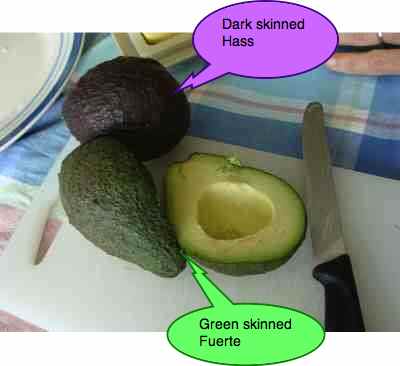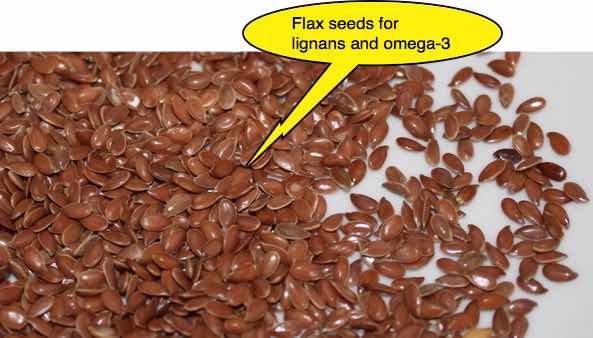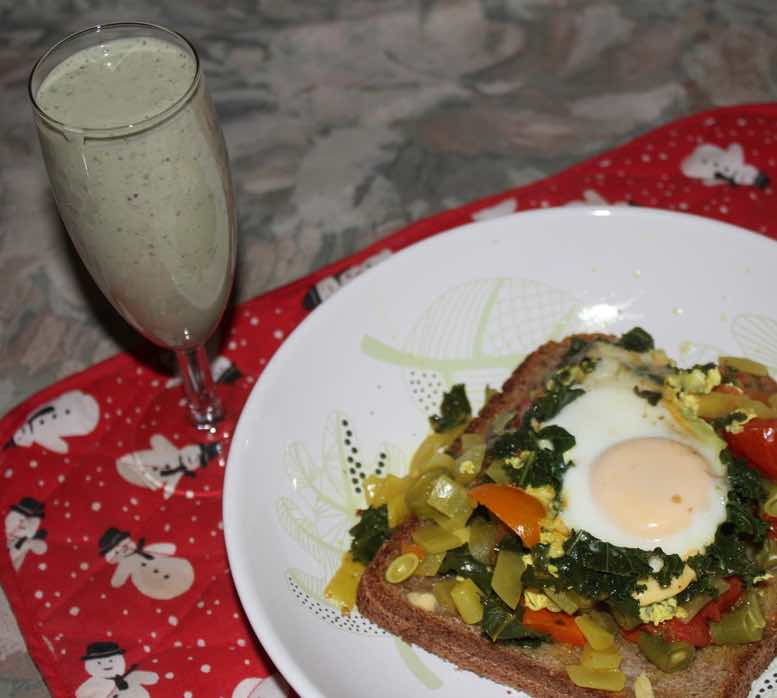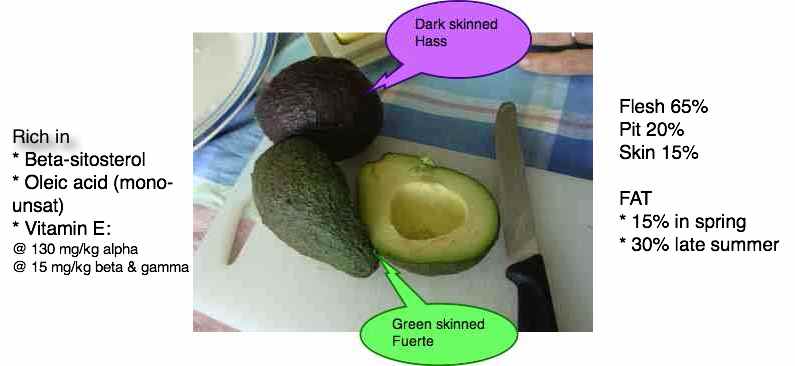- Bernard Preston homepage
- Avocado
Avocado fat
Avocado fat like that from olive oil is pure, nourishing food.
Let us start with a short tour of the fats, because they get bad press.
They make us fat, right, so we should cut out as many as possible out? That is wrong; a big mistake.
Sixty percent of the brain is fat, and all nerves are coated in a myelin sheath. Cut out all the oils from your food and you will die, literally.
Limit the essential fatty acids and you will get very sick.
Motor neuron disease for example is associated with a food combination that is high in carbohydrate but very low in fat.

This page was last updated by Bernard Preston on 7th April, 2021.
Saturated fats in the main come from animal
sources such as red meat, butter, and eggs. Cholesterol is an example, but note that it is mainly the low density lipoprotein that is bad
for us; and in fact only one fraction of them. The HDL kind is associated with protection against heart and blood vessel disease.
The hormones and neurotransmitters in your brain are made from cholesterol. You cannot live without it; it is definitely not all bad.
And in any case researchers have now found that your blood cholesterol levels are largely independent of the fat you eat; it is food that raises your glucose that the liver turns into VLDL that is the killer. That is why the AHA actually recommends eggs.
Avocado Fat
Avocado fat is rich in the queen of them all, the mono-unsaturated oil called oleic acid.
Cholesterol is also high in coconut oil, and we will look at that in another page. Suffice it to say, it is controversial; high in saturated fat, but not bad for your well-being?
There is a strong case to be made for doing all our high temperature frying with saturated fats; butter and coconut oil, and those rich in monounsaturated fatty acids, for example, from the olive and avocado.
Only the latter will not give you high temperatures.
Olive and avocado fat have a high stability when heated which makes them perfect for frying and baking. They are excellent for the barbecue too since most common vegetable oils such as sunflower are rich in polyunsaturates which tend to oxidize on hot surfaces and the open flames used in outdoor cooking.
Monounsaturates are far more stable.
Unsaturated fats come from fish, seed and fruit oils. They are nourishing, but there are a few very large question marks.
Unsaturated fats come in two types; both are good. In fact they are essential; we cannot live without them.
Oleic acid
Oleic acid is the main ingredient in myelin, the fat that forms the lining of your nerves.
Mono-unsaturated fatty acids (MUFAs)
- Monos
are found in both seed and fruit oils, but are particularly high in the
olive and avocado. Nearly three quarters of the fat is
mono-unsaturated. Oleic acid is the most common.
- Oleic acid is the fat the body
uses to sheath a nerve. Without that "myelin" covering they will not conduct impulses to and from the organs like muscles and eyes, for example.
- Certain "demyelinating" neurological diseases like MS attack that lining. A generous amount of oleic acid from our food is vital.
Poly-unsaturated fatty acids (PUFAs)
- Polys
are found mainly in seed oils such as sunflower, corn, and canola; and
soybeans. They too are nutritious and, in fact, a very necessary part of our meals. Omega-3 fatty acids are PUFAS. But here are two questions.
But number 1
Seed oils are solvent extracted at high temperatures and because polys are heat labile they are easily oxidised, producing free radicals that start tumours in cells. Never use sunflower or canola for high temperature frying and baking, for example.
If you can find cold-pressed seed oils, then by all means enjoy them, but still not in high temperature cooking.
But number 2
The ratio of polys / monos in your food should not be too high. In Mediterranean islands like Crete, where olive oil consumption is predominant, people have very low rates of heart disease.
It is true, they eat more fish, fruit and vegetables too, but even
after taking that into account, plus the lower levels of stress, it is
strongly agreed amongst food scientists that olive oil (read MONOs) is
the reason why the Greek islanders are so strong. (Keys Seven Country study.) So, avocados too; they are both from fruit trees.
General rule
Polyunsaturates are good, in fact essential from our food, but keep your purchases of Canola and sunflower oil to a minimum, and never use them for frying.
Canola is controversial for many reasons; scientists are undecided whether it is good for us or not. Google it.
For
frying use butter and perhaps coconut oil and (it is wasteful, perhaps) olive
oil. Keep your blood fat levels down by eating copious amounts of those foods that lower cholesterol. They do it by controlling sugar levels arriving at the liver from the small intestine.
Essential fatty acids
There are two fatty acids that we cannot live without. Deny yourself and you will be stunted and die; literally. Their names are Linoleic and Alpha Linolenic acid. Both are Polys and both are found in adequate amounts in avocados, olives and sunflower oil.
For more information, type essential fatty acids into Google and go to Wikipedia; it is complex biochemistry.
But you can relax on that score.
From an average meal, even if you are food junkie, we get plenty of most essential fats. What is in short supply is the alpha linolenic acid, a vital omega 3 oil that the body can convert to the other two, DHA and EPA.
So, how much omega-3 is there in avocado fat?
I hope you noticed that sunflower oil, olives and most margarines all have zero omega-3; it is the anti-inflammatory fat that is absolutely vital.
The richest source is fish oil and the best from vegetable is flax seed. Scroll down for more information. But avocados are also rich in that one essential omega-3, alpha linolenic acid.
A cup of avocado weighing 150g contains 0.18g of omega-3 alpha linolenic acid. That is less than 10 percent of that found in a tablespoon of flaxseeds, but it all helps.
Olive oil has other strongly anti-inflammatory properties, but not from omega 3.

Omega-3
Fats are essential from our food, but we need to eat more of the best ones; from the olive and avocado, and cold-pressed oils (if you can find them); and fish and flaxseed for their omega-3.
Where possible enjoy the whole food rather than the extracted oils.
Olive oil is the possible exception as it is not solvent-extracted; still the whole fruit is wonderful with the fibre and all the phytosterols.
- Olive oil benefits ...
- Fish oil ...
- Flax seed nutrition information ...
Use the site search function above to find links to these topics.
And less of the LDL cholesterol-rich animal fats in red meat, dairy products and eggs. Not cut them all out, just eat less of them.
The richest, cheapest source of nutritious mono-unsaturated fatty acids is the avocado. In the whole fruit it is extremely good but, yes, the calories are a problem if you pig out; I enjoy a half most days when they are in season.
Compare the value of avocado fat with sesame oil benefits too; the fatty acids in seeds are quite different to those from a fruit.
Calories in Avocado
An average Hass weighs about 8oz, so after removal of the skin and the pit, the flesh of half an avocado might be a little less than 100g (say about 3.5oz)
Food
- Fat
- Calories
- Protein
- Cholesterol
Avocado
- 17g
- 177 cals
- 2g
- 0
Milk (250ml)
- 3.2g
- 156 cals
- 8g
- 25 mg
In fact I recommend both; if you accept that raised cholesterol comes from refined carbohydrate, then you need have no fear of the fat, calories or LDL in either avocados or milk. Both are nutritious but do stick to moderate portion sizes obviously.
More details can be found at Calories in Avocado.
At our page on avocado benefits you will find much more information about this wonderful fruit.
"Researchers at Penn State found that eating a moderate-fat diet that includes a daily avocado (that's around 200-300 calories, so substitute it for other food) reduces bad LDL cholesterol; especially the small, dense oxidised LDL particles that are tied to cardiovascular disease."
- Drs Oz and Roizen, MDs
Anti-tumorogenic effect of oleic acid
Oleic acid is the mono which is high in the olive and avocado fat has been shown to have an anti-tumour effect. (BCR 2010, 12:211).
It is also the fatty acid that forms the sheath around the neurons; hence my interest as a DC. Demyelinating diseases like MS coupled with a deficiency of a oleic acid affect nerve conduction.
The prostate gland demands more vitamin E and phytochemicals from avocados, for example.
Copy and paste "prostate gland health" into Site Search above for more information.
Avocado and spinach soup
One of the things that I love about the good wife's innovative and delicious cooking is her
willingness to try something new. Last night she made an old
favourite, a very popular Popeye spinach soup; and slipped in half an avo
without telling us. Nobody could believe just how good it tasted. I will
twist her arm for the recipe. Yes, it raised the calories but again
nutritious fat; the stuff that your brains and nerves thrive on.
Spinach has copious amounts of anti-tumour substances called phytosterols. Avocados too are one of the richest sources of beta-sitosterol which is associated with many of the benefits of wellness, including the treatment of Benign Prostatic Hypertrophy; a nasty problem of older men.
Avocado contains 132mg of beta-sitosterol in a typical 173g Hass. (K Duester, J Am D Assoc).
Citrus the next richest source of fruit beta-sitosterol contains only 1/4 of that in an avocado.
Avocado is richer than Saw Palmetto (more than double) the usual source for Beta-Sitosterol in capsules. Even better is maize, so enjoy your corn on the cob too.
Olive oil has about half the amount of beta-sitosterol of avocado fat.
The pharmaceutical industry loves to find natural substances, put them in a tablet and sell them to you at 1000 times the cost. Do not buy beta-sitosterol; just eat avocados, maize and use olive oil.
And do not wait until you have BPH; an ounce of prevention is definitely better than a pound of cure.
This Mexican avocado soup is another way we enjoy this wonderful fruit from Central America.
Mid-morning hunger
There is anecdotal evidence that eating more protein and fat for breakfast lessens the desire for a 10am snack; the medical term is satiety. Traditionally, folk would have an egg or cheese but these are high in cholesterol and might worry some.
Half an avocado for breakfast, and either a chickpea dish like hummus or a bean dish, rich in vegetable protein with added olive oil would fit the bill.
Make this authentic hummus recipe; in only 4 minutes once you have the ingredients at hand.
One particular cure for mid-morning hunger and I do acknowledge it is a bit crazy but I guarantee that it will work for you is Eggs Hilton; try it. It is alkalising and helps keep my gout at bay too.
From a can the lima and broad beans are not very exciting so I
recommend you start growing them; the mix of legumes and an egg on
toast, using avocado fat instead of butter will satisfy you all day. Eggs Hilton will provide satiety for the whole day; we enjoy it several times a week.
 Eggs Hilton with a kefir smoothie
Eggs Hilton with a kefir smoothieADD PROTEIN AND FAT OF PLANT ORIGIN
New research reveals that the low starch ketogenic meal plans are indeed fine but only if you replace the calories from the carbs with protein and fat of plant origin; if you exchange it with more meat, chicken or butter then it actually reduces your life expectancy. That means more avocados and olive oil, and plenty of legumes(1).
Some companies are experimenting with producing extra virgin oil from second grade avocados, cold-pressed like that from the olive but it is still rather expensive. It is easier to eat half a fruit. I am
going to start experimenting with using them for a smoothie for
breakfast.
There is interesting research coming out, and enthusiasm for banting; it is refined carbohydrate that stimulates the hunger centre in the brain. Folk on low carb food have more energy and less hunger pangs; and lose weight more successfully.
I would suggest that it is the refined starches like sugar and cornflakes in particular that set up these cravings for more. Have you ever refused a second helping of syrup on pancakes?
Vitamin E and the prostate gland
There is quite strong research suggesting that you should obtain your vitamin E from natural whole foods, cold pressed fats and freshly-ground grains rather than taking it in capsule form. A whole avocado contains more than a quarter of the required daily amount.
For example taking alpha-tocopherol, the most common form of vitamin E in capsules, inhibits the absorption of the gamma isomer that gives 5 times protection against prostate tumours.
Little is known about six additional isotopes of vitamin E but it seems likely they are all important; taking large quantities of one form would inhibit the absorption of others.
Recent research suggests that taking pure alpha vitamin E may actually increase the risk of prostate metastatic disease.
However that is only a problem for those seeking all their nutrients from supplements. It is well known, and fully researched that it is the gamma vitamin E that gives protection against prostate tumours.
But in nature as in avocado fat, there is a mixture of the alpha and gamma forms of vitamin E and the other six too, giving the known protection; over and above the beta-sitosterol.
If
you are taking vitamin E capsules, make sure it is not pure
alpha tocopherol. Rather eat an avocado a day; it is the best fat which is cheaper, safer and more
effective with no known side-effects.
Newsletter
Our newsletter is entitled "create a cyan zone" at your home, preserving both yourself and Mother Earth for future generations; and your family too, of course. We promise not to spam you with daily emails promoting various products. You may get an occasional nudge to buy one of my books.
Here are the back issues.
- Investing in long-term health
- Diseases from plastic exposure
- Intensive lifestyle management for obesity has limited value
- A world largely devoid of Parkinson's Disease
- The impact of friendly bacteria in the tum on the prevention of cancer
- There's a hole in the bucket
- Everyone is talking about weight loss drugs
- Pull the sweet tooth
- If you suffer from heartburn plant a susu
- Refined maize meal and stunting
- Should agriculture and industry get priority for water and electricity?
- Nature is calling
- Mill your own flour
- Bake your own sourdough bread
- Microplastics from our water
- Alternative types of water storage
- Wear your clothes out
- Comfort foods
- Create a bee-friendly environment
- Go to bed slightly hungry
- Keep bees
- Blue zone folk are religious
- Reduce plastic waste
- Family is important
- What can go in compost?
- Grow broad beans for longevity
- Harvest and store sunshine
- Blue zone exercise
- Harvest and store your rainwater
- Create a cyan zone at your home
Avocado Fat
Avocado fat along with the olive comes from a fruit tree.

There is intense interest currently in the scientific world about a carotenoid called lutein. It has a yellow colour due to its property of absorbing the high energy blue light that may damage the eye. It is very rich in avocados.
The research is centering around the affect of lutein supplementation; better still, eat more avocado. Early signs are promising that the carotenoid is beneficial in preventing macular degeneration and retinitis pigementosa.
Lutein is only absorbed in the presence of fat in the intestine; it is yet another reason why high carbohydrate, low fat meal plans are proving so dangerous. Oddly, it is refined starch and sugar that makes us obese, not the oily foods; unless you really pig out. Our dogs certainly put on weight in the avocado season; but then if you eat five to ten a day, what would you expect?
Beware though because the food industry adds synthetic lutein to chicken feed to trick you into thinking the eggs are better and free range. Give your chickens avocados by all means and you will have delicious yellow yolks.
Mojo de aguacate
Mojos have been added by Spaniards to their food since their civilisation began; to dicky up any dish that was either dull in itself or became boring after eating it regularly.
Let us be honest, there are many foods that we know we should eat but for one reason or another our taste buds do not hanker after them; enter the mojos.
In the main they use garlic, olive oil and either lemon juice or white wine vinegar. In the case of mojo de aguacate, they add some avocado fat. It is simply divine with a perhaps dull green salad but you can enjoy it on the side with any dish.
- One whole garlic bulb, peeled
- 200 ml olive oil
- Half a lime or lemon, peeled and de-pipped; use the pulp and a little zest
- 1 tsp coarse salt
- Handful of parsley or green coriander (cilantro)
- One avocado
- One peppadew including the seeds
I like the stick blender because it is easier to clean but you could use a food processor. Add a bit of chili if you like it spicy.
Guacamole with pumpkin seeds is another great favourite.
Autumn veggie garden
Autumn veggie garden is when we really get excited. It is the season of mellow fruitfulness; and it includes the first avocados beginning to ripen.
Even our dogs and the hens too love the avocado fat from
any that have passed their sell by date; or from which the monkeys have
taken a bite.
And of course, in mild climates the autumn veggie garden is when you are preparing to plant all those mouth-watering foods that tolerate mild frost; for example green peas, broccoli and beetroot.
Avocado trees
Growing avocado trees is not intrinsically difficult but one does need a mild climate with no more than light frosts.
We have four in our garden; three that were grafted; a Hass, a Fuerte and a Pinkerton all of which bear prolifically. The fourth, which our son planted as a pip some ten years ago still has not borne with zero contribution to avocado fat.
Stick with grafted fruit trees; they bear quicker and do not grow so tall that you cannot reap the pears.
AVOCADO FAT
If this page about avocado fat has put your mind at rest about the calories, then would you forward it to another doubting Thomas?
When browsing use right click and "Open Link in New Tab" or you may get a bad gateway signal.
Did you find this page interesting? How about forwarding it to a friend, or book and food junkie? Better still, a social mead tick would help.
- Bernard Preston homepage
- Avocado
Address:
56 Groenekloof Rd,
Hilton, KZN
South Africa
Website:
https://www.bernard-preston.com